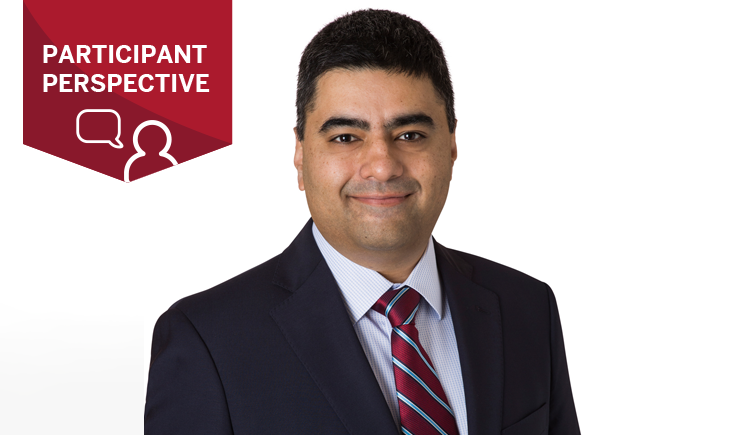
If you’re a surgeon looking to build your skills to take on a larger leadership role in your organization, then in addition to improving your technical skills and knowledge, you’ll need to focus on taking good care of your health. A review published in the Journal of the American College of Surgeons pre-COVID-19 found that surgeons are the medical specialty at the highest risk for experiencing burnout. In many organizations, changes brought about by the pandemic have caused the problem to worsen.
One important way to build your resiliency is by adopting the core principles of lifestyle medicine, according to Beth Frates, MD, a pioneer in Lifestyle Medicine education who also teaches at Harvard Medical School and Harvard Extension School. Frates recently presented a workshop on Lifestyle Medicine for The Surgical Leadership Program at Harvard Medical School (HMS) to empower surgeons to optimize their wellness and set an excellent example for their patients.
Lifestyle Interventions Give Surgeons a Competitive Edge
Frates explains that Lifestyle Medicine promotes interventions that prevent or treat cardiovascular disease and stroke. She first became immersed in this field several decades ago when her father, an executive in New York City, suffered a heart attack due to poor diet, lack of exercise, and extreme stress. After going through this life-changing event, she decided to pursue a career in medicine to help prevent others from experiencing a similar fate.
“My father made a complete recovery due to important lifestyle changes,” she says. “He learned how to exercise frequently and my mom learned about cooking healthy food. We also learned about resiliency and stress management,” she remembers. She now shares the best practices in the field and translates them for other medical professionals. She focuses on educating them about their risks and what to do about them so they can enjoy fruitful careers and long, healthy lives.
Six Pillars of Lifestyle Medicine
Frates points out that the six pillars of Lifestyle Medicine are important to incorporate as part of your daily routine for the best results. They include:
Exercising regularly: Frates stresses that exercise is a powerful prescription for good health. Exercise prevents cardiac disease and stroke, reduces blood pressure and blood glucose, controls weight, and prevents obesity and bone loss. It also improves confidence, mood, and decreases stress. Some studies compare medications to exercise in treating overall heart disease and stroke. In terms of overall mortality, exercise does just as well‚ and in some cases, even better than medications. It would take almost ten medications to provide all the benefits exercise provides for the body and the brain.
“Twenty minutes of walking could increase your creativity and ability to solve complex problems. Ten minutes of walking could lower your anxiety and stress levels. Get outside and take a walk or take the stairs to enjoy the benefits of movement,” she adds.
To enjoy the full effects of exercise, the US Health and Human Services recommend that people engage in 150 minutes (2.5 hours) of vigorous physical activity a week, along with strength training twice a week on non-consecutive days. The latest recommendations are also to stand up every hour (or every half-hour if you have prediabetes or are diabetic). Some easy ways to incorporate exercise into your daily life include sitting on an exercise ball (instead of a chair) to engage your core, planning walking meetings, and using an under-desk peddler/mini bicycle while sitting at your computer.
A bonus: when you engage in an activity such as walking and also do strength training exercises, your patients may reap some benefits in the process, too. “Physicians who exercise are more likely to counsel their patients to try the same kind of exercise,” Frates notes, so everyone wins.
- Eating a diet high in fruits and vegetables. Frates says that people should aim for five or more servings of fruits and vegetables combined daily. She points out that this can reduce the risk of cardiovascular disease and stroke by 20 percent, according to several studies. The World Health Organization also recommends getting 25 grams of fiber daily, lowering the risk of type 2 diabetes, heart disease, and cancer. Fiber is also important for the microbiome. “The bacteria in the gut ferment fiber, which produces short chain fatty acids like butyrate, pyruvate, and propionate. These, in turn, have a positive impact on energy metabolism, glucose metabolism, lipid metabolism, and immunity,” she adds.
- Managing stress. Surgeons deal with stress regularly since the job demands can be very taxing. Over the long term, excessive pressure causes damage to multiple organs. “Some evidence-based stress management techniques I recommend include getting out into nature, exercising, practicing mindfulness, listening to music, practicing yoga, and taking deep breaths,” she says.
- Tapping into your social connections. A recent BMJ Quality and Safety study revealed that high-performing surgeons had a strong culture of teamwork. In addition, patients with a solid social network were less likely to die, according to another study conducted several decades ago, and this finding is still relevant, Frates says. She defines high-quality connections where you feel safe being honest with positive and negative feedback and where the relationship is resilient. Good relationships are also open to new ideas and growth. She notes such connections should happen in the workplace and your personal life. You can utilize your social network to interact with people who fill you up and help you replenish after a stressful day at work. At the same time, you can also serve as a charismatic adult for others so that the benefits can be multi-fold.
- Getting a good night’s sleep. According to the National Sleep Foundation, adults must get 7 to 9 hours of sleep every night. This is necessary for you to function at your best, Frates says. On the flip side, when you don’t get enough sleep regularly, you’ll experience poorer functioning and have more trouble managing stress and you may also be more prone to eat high-calorie foods that can lead to weight gain. She points out that people who follow the Mediterranean Diet (a heart-healthy diet high in healthy fats, fruits, vegetables, nuts, beans, and seeds) will improve their sleep quality, will find it easier to control their weight, and will experience other health benefits, too. She says different ways to improve your sleep quality—and quantity—including going to bed simultaneously, sleeping in a dark, quiet room that’s cool, and limiting screen time before bed.
- Avoiding alcohol/substance use. During COVID-19, there has been an increase in drinking alcohol among healthcare professionals and the general public. While many people think drinking before bed will help them fall asleep, in reality, alcohol can lead to interrupted sleep and poorer sleep quality, Frates says. The US Centers for Disease Control and Prevention (CDC) and the American Heart Association (AHA) guidelines say alcohol use should be limited to one daily drink for a woman and two for a man. She also acknowledges that the latest recommendation is not to start drinking if you don’t already do so.
Adopting these Changes within Your Organization
While all of these recommendations can take time to implement, they also provide a clear roadmap that surgeons can follow to make wise lifestyle choices and improve their health. “Lifestyle Medicine is a journey,” Frates stresses. She also points out that a good example comes from the top down, so as you move into more prominent leadership roles within your organization, you can set the stage for your team and help them prioritize their health by assisting them in finding the time to adopt these important practices.
To help more clinicians follow the tenets of Lifestyle Medicine, she shares her Lifestyle Medicine syllabus online through the American College of Lifestyle Medicine (ACLM). She has also developed a Lifestyle Medicine Interest Group (LMIG) that provides lunch-and-learn lectures at medical schools throughout the country, including at HMS. In addition, she has published several books on this topic, including The Lifestyle Medicine Handbook: An Introduction to the Power of Healthy Habits. You can follow Frates on Twitter for more Lifestyle Medicine tips @BethFratesMD.
Written by Lisa D. Ellis


